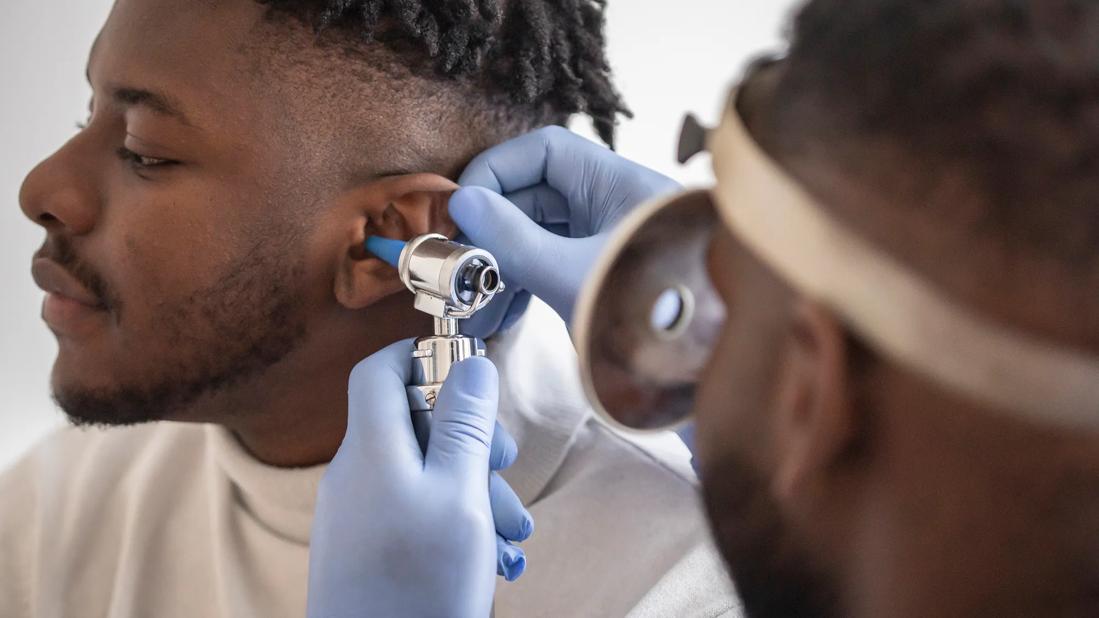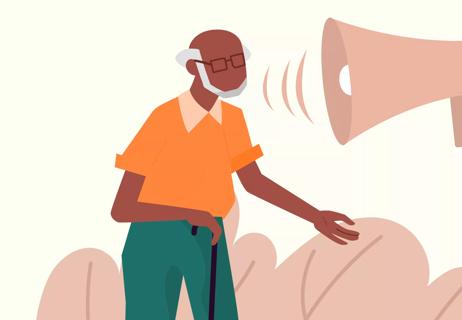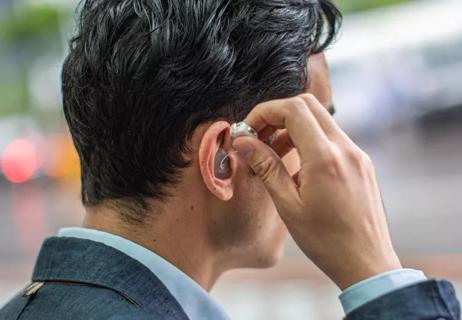Sudden hearing loss can have many causes — but it’s important to seek treatment fast

It can be easy to brush off a sudden change in your hearing. Maybe my ear is just clogged. Or, My allergies are just acting up.
Advertisement
Cleveland Clinic is a non-profit academic medical center. Advertising on our site helps support our mission. We do not endorse non-Cleveland Clinic products or services. Policy
But it’s actually very important to see a provider right away if it happens.
“There are not many emergencies of the ear, but sudden hearing loss is one thing that we would consider an emergency,” says otology physician assistant Caitlin Sukalac, PA-C.
Sukalac breaks down what sudden hearing loss is, some common causes and how to identify it.
Sudden hearing loss, also called sudden sensorineural hearing loss or SSNHL, is when you lose hearing — usually just in one ear — over the course of three days or fewer. It can happen to anyone, but it’s most common in adults in their 40s and 50s.
Sudden hearing loss is different from other hearing loss because it comes on fast. For most people, hearing loss happens gradually over a period of time, rather than occurring over a short period of time.
When hearing loss comes on suddenly and without warning — one day all is well, the next ... not so much — that’s SSNHL.
It’s different from the common temporary phenomenon called eustachian tube dysfunction (the cloudy hearing and full feeling in your ear that you might experience when, say, traveling on an airplane).
SSNHL also differs from a temporary and intermittent feeling of blockage caused by allergies or a cold, though it can feel similar.
Advertisement
Dizziness or vertigo and tinnitus may accompany SSNHL, too. You might notice them just prior to or after the SSNHL occurs.
“That’s because the brain doesn’t know what to do with the changes of signal it’s getting from the ear. So, it either misinterprets the ‘bad signal’ it’s getting as noise, or it’s trying to fill in the gap of the hearing loss — almost like a phantom sound," Sukalac explains.
So, if you experience a sudden change in your hearing, what do you do?
“Any kind of noticeable hearing loss, ear fullness or pressure, or sudden onset of tinnitus that doesn’t go away immediately should prompt a visit to your primary care doctor or urgent care center for investigation,” Sukalac recommends.
In most cases, healthcare providers can’t identify a cause for sudden hearing loss in one ear, which is typically termed idiopathic sudden sensorineural hearing loss.
But when they can, SSNHL is typically caused by damage to your inner ear or because of problems with the nerve fibers that deliver information from your ear to your brain.
Why does that happen? Sukalac shares other common causes of SSNHL.
Viral or bacterial infections can damage the delicate structures of your inner ear, leading to sudden hearing loss. Other medical conditions, like Ménière’s disease, can cause hearing loss in one ear that develops suddenly, along with vertigo, ear fullness and tinnitus.
In some cases, sudden hearing loss can be caused by acoustic neuromas, also called vestibular schwannomas. These noncancerous (benign) tumors affect your auditory nerve, which can cause sudden or gradual hearing loss in one ear.
“These tumors are uncommon, but an early symptom of this tumor is sudden hearing loss. It’s always best to get an MRI to rule this out as a cause, especially when there is no other identifiable source of the SSNHL,” Sukalac says.
Sometimes, an autoimmune disease, like rheumatoid arthritis or lupus, may be the culprit behind sudden hearing loss.
It can also be attributed to autoimmune inner ear disease (AIED), where your body’s immune system mistakenly attacks the cells of your inner ear. That causes inflammation, which can lead to hearing loss. While this can cause one-sided SSNHL, it’s most common in people with SSNHL in both ears.
Side effects of some medications can damage your inner ear, leading to SSNHL. It’s called ototoxicity, and there are several kinds of ototoxic meds, including:
Advertisement
If you’re experiencing sudden hearing loss shortly after starting a new medication, let your healthcare provider know right away.
Just like you sometimes see in action movies, a head injury or trauma can cause sudden hearing loss. This happens when a forceful impact damages the tiny cells, affects fluid balance, causes swelling or otherwise impacts the function of your inner ear.
If the impact is strong enough, head trauma can also affect the pathways in your brain that are responsible for processing sound.
If a primary care or urgent care provider doesn’t see any signs of a blockage or infection in your ear that could be causing sudden hearing loss, the next step is a hearing test and a referral to an ear, nose and throat specialist. Most often, the hearing test will be completed before seeing an otolaryngologist, or ENT specialist.
The specialist will want to rule out anything that could be causing the symptoms and may also order an MRI to rule out other problems.
If SSNHL is determined to be the culprit for your hearing loss, they’ll likely prescribe steroid therapy to reduce inflammation in your inner ear. This typically starts with oral treatment (pills). If you can’t have oral treatment due to underlying medical conditions, your provider may recommend steroid injections into your eardrum.
Advertisement
Studies find that half to two-thirds of people who experience SSNHL recover their hearing. Those who don’t may benefit from other treatments, like hearing aids or cochlear implants.
While there isn’t necessarily a way to predict who will and who won’t get their full hearing back, Sukalac notes that people with a mild sudden hearing loss who seek treatment within a week tend to have higher rates of recovery.
In the same vein, it’s hard to know who’s going to experience sudden hearing loss in the first place. But Sukalac says recent research has uncovered associations between people with heart disease risk factors, like high cholesterol, diabetes or high blood pressure, and those who develop SSNHL.
“Anything that can affect the little blood vessels coursing through our body can make somebody more likely to have sudden sensorineural hearing loss,” she explains.
The best way to avoid it? “Take care of yourself and any chronic medical problems you may have,” Sukalac advises. “All the things that are important for heart health are important for ear health as well.”
When it comes to sudden hearing loss, the quicker you seek treatment, the better the outcome may be.
The outcome of treatment is largely dependent on the degree of hearing loss, the cause, and how long you go between the onset of the hearing loss and receiving treatment.
Advertisement
While you may be tempted to brush off problems with your ears, hearing loss, ear fullness or pressure, or sudden onset of tinnitus may be pointing to a larger issue. Sudden hearing loss can be treated with a better outcome if you reach out to a healthcare provider and take quick action.

Sign up for our Health Essentials emails for expert guidance on nutrition, fitness, sleep, skin care and more.
Learn more about our editorial process.
Advertisement

Hearing aids can be enough for some people, but other devices — like for your phone, TV and fire alarm — can help, too

Untreated hearing loss can affect kids’ speech and language development and their overall quality of life

Reduce background noise, don’t talk too fast or too slow and above all, ask what’s most helpful to them

Ringing is already a sign of damage, but you can take steps to keep your hearing protected

Keeping your brain healthy is key

Learn how to help encourage a better quality of life

Damage accumulates over time

Routine screenings at school are normal and important

Even small moments of time outdoors can help reduce stress, boost mood and restore a sense of calm

A correct prescription helps your eyes see clearly — but as natural changes occur, you may need stronger or different eyeglasses

Both are medical emergencies, but they are very distinct events with different causes